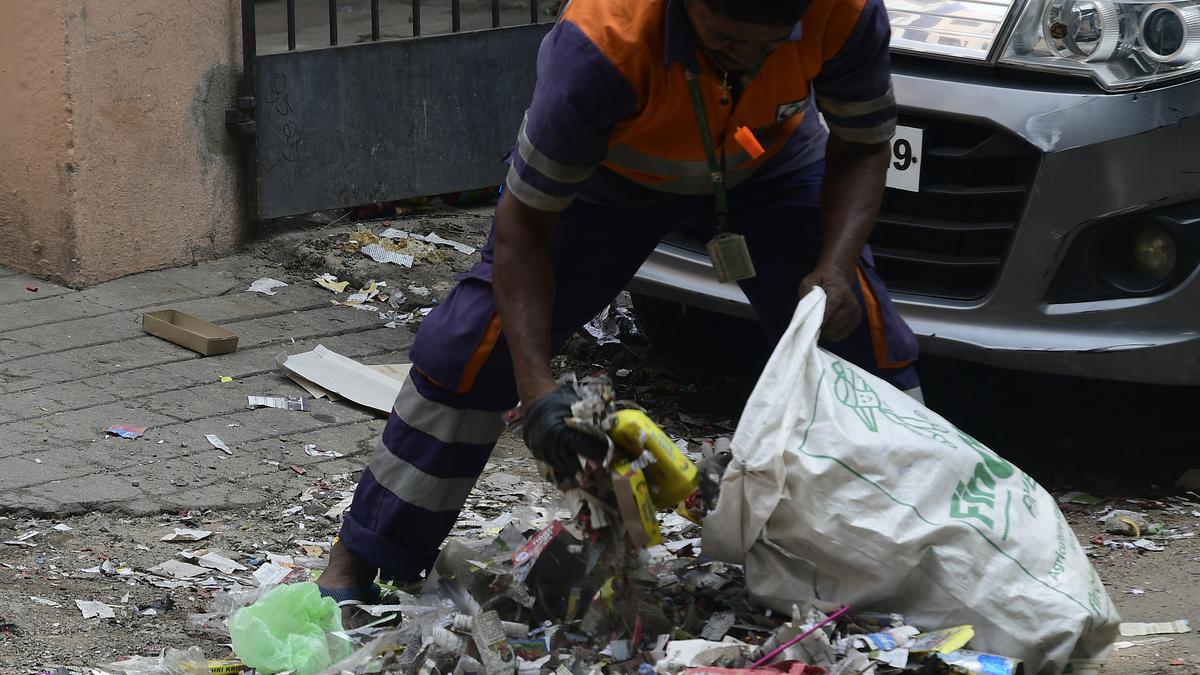
Waste collection reduces during Deepavali in Chennai owing to residents heading to their hometowns
The Hindu
Chennai Corp. waste collection reduced to 4600 tonnes/day during Deepavali due to mass departure of residents. Waste collection in Anna Nagar & Ambattur wards decreased by 30-40%. Electric tricycle operators reported 25% reduction in waste collection. Posh residential areas reported increased waste generation.
Solid waste collection in zones of Chennai Corporation has decreased during Deepavali reportedly because of the mass departure of residents to celebrate the festival in their native villages and hometowns. Chennai Corporation Chief Engineer N.Mahesan said the waste collection per day during Deepavali holidays has reduced to 4,600 tonnes in the city.
According to Corporation Commissioner J.Radhakrishnan, the waste collected per day in the city is around 6,150 tonnes, with an estimated waste generation of around 700 gram from each of the 89 lakh residents in the 426 sq. km. of the Chennai Corporation. Anna Nagar ward 104 councillor T.V.Shemmozhi of DMK said an estimated 30% to 40% of the residents in his ward have gone to their hometowns for Deepavali.
“In ward 104, waste collection decreased to 26.64 tonnes on November 12 (Sunday), when compared to 34.43 tonnes on November 10,” said Mr.Shemmozhi.
AIADMK councillor J. John of Ward 84 in Ambattur also said an estimated 30% to 40% of the residents in ward 84 have gone to nativeplaces. “The waste collected on Sunday was 15 tonnes in ward 84. The normal waste collection stands around 20 tonnes every day. The waste collection decreased in the 51 bins placed at 10 locations of my ward because many residents have left the city this Deepavali,” said Mr. John.
According to operators of electric tricycles, the number of trips has reduced from 4 per day to 3 trips per day during Deepavali. “Each battery-operated vehicle carries 200 kg of waste in one trip. Each operator has reported a reduction of 200 kg on Deepavali, which is around 25% reduction in waste collection,” said a conservancy worker.
Areas with high net worth individuals, however, reported a rise in waste generation during Deepavali, according to conservancy workers. “Areas such as Gopalapuram and CIT Colony have generated more waste during Deepavali,” said a conservancy worker. In some wards with posh residential areas, the waste generation has reportedly increased because of the festival. Ward 99 Councillor Parithi Elamsurithi of the DMK said he did not receive any complaints pertaining to waste collection during Deepavali. “The waste collection in the posh residential areas of Purasawalkam was high during Deepavali. But the workers cleared all the waste. There were no complaints,” said Mr.Elamsurithi.













